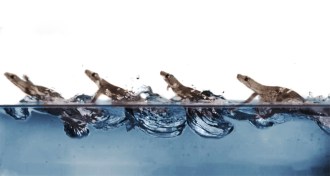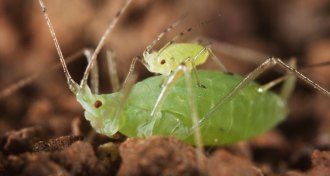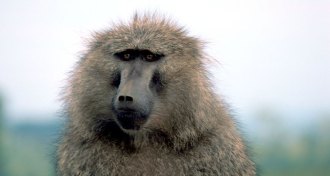All Stories
-
 Health & Medicine
Health & MedicineA gut-brain link for Parkinson’s gets a closer look
Early evidence suggests that Parkinson’s may be a gut disease that affects the brain.
By Laura Beil -
 Health & Medicine
Health & MedicineTwo new books explore the science and history of the 1918 flu pandemic
One-hundred years after the Spanish flu, ‘Pandemic 1918’ and ‘Influenza’ provide a new look at the global outbreak.
-
 Climate
ClimateGlobal carbon dioxide emissions will hit a record high in 2018
Carbon dioxide emissions from China, the United States and India all rose this year, a new report finds.
-
 Neuroscience
NeuroscienceThe uterus may play a role in memory
In lab tests, rats that underwent hysterectomies had worse spatial memories.
-
 Oceans
OceansVolcanic eruptions that depleted ocean oxygen may have set off the Great Dying
Massive eruptions from volcanoes spewing greenhouse gases 252 million years ago may have triggered Earth’s biggest mass extinction.
-
 Animals
AnimalsHere’s how geckos (almost) walk on water
New high-speed video reveals how geckos use a hybrid walking-swimming gait in water to reach speeds similar to those on land.
-
 Genetics
GeneticsA 5,000-year-old mass grave harbors the oldest plague bacteria ever found
DNA from an ancient strain of the plague-causing bacterium could help uncover the origins of the deadly disease.
By Bruce Bower -
 Animals
AnimalsPea aphid youngsters use piggyback rides to escape a crisis
When some mammal is about to munch their plant, aphids drop to the ground and youngsters want a ride to safety.
By Susan Milius -
 Health & Medicine
Health & MedicineBaboons survive 6 months after getting a pig heart transplant
A team of German scientists used new methods to successfully transplant genetically modified and fully functioning pig hearts into baboons.
-
 Particle Physics
Particle PhysicsA controversial sighting of dark matter is looking even shakier
Two dark matter experiments disagree despite using the same type of detector material.
-
 Astronomy
AstronomyAstronomers find far-flung wind from a black hole in the universe’s first light
The detection of black hole winds far from their host galaxy could reveal details of how galaxies and black holes grow up together.
-
 Science & Society
Science & SocietySeeking a panacea in the gut’s microbiome
Editor in Chief Nancy Shute discusses the potential role of the gut microbiome in Parkinson's disease and one reporter's connection to the story.
By Nancy Shute